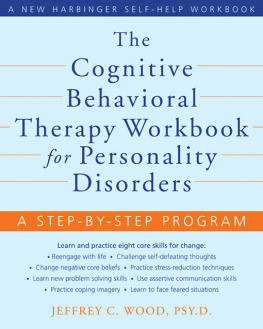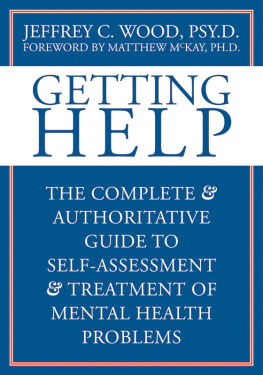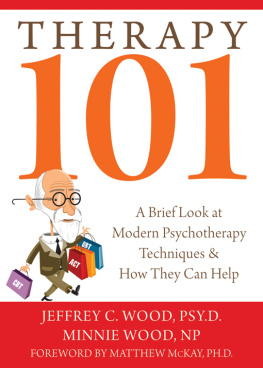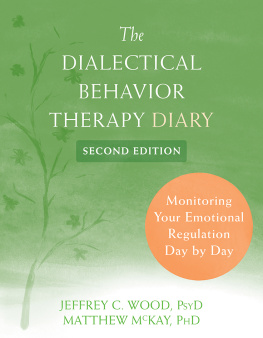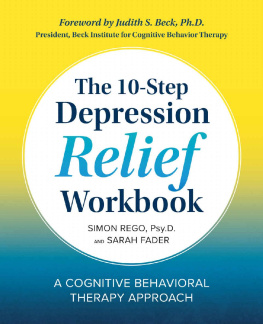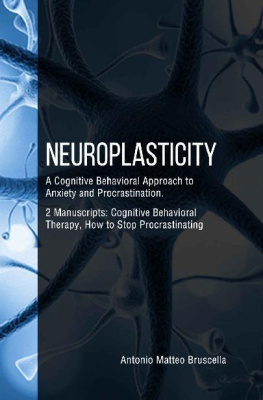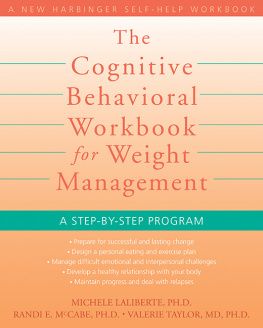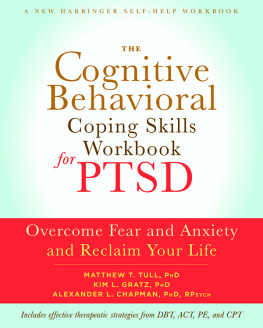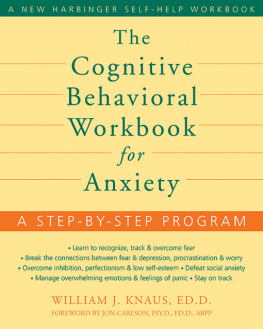Jeffrey C. Wood - The Cognitive Behavioral Therapy Workbook for Personality Disorders: A Step-by-Step Program
Here you can read online Jeffrey C. Wood - The Cognitive Behavioral Therapy Workbook for Personality Disorders: A Step-by-Step Program full text of the book (entire story) in english for free. Download pdf and epub, get meaning, cover and reviews about this ebook. year: 2010, publisher: New Harbinger Publications, genre: Religion. Description of the work, (preface) as well as reviews are available. Best literature library LitArk.com created for fans of good reading and offers a wide selection of genres:
Romance novel
Science fiction
Adventure
Detective
Science
History
Home and family
Prose
Art
Politics
Computer
Non-fiction
Religion
Business
Children
Humor
Choose a favorite category and find really read worthwhile books. Enjoy immersion in the world of imagination, feel the emotions of the characters or learn something new for yourself, make an fascinating discovery.
- Book:The Cognitive Behavioral Therapy Workbook for Personality Disorders: A Step-by-Step Program
- Author:
- Publisher:New Harbinger Publications
- Genre:
- Year:2010
- Rating:4 / 5
- Favourites:Add to favourites
- Your mark:
- 80
- 1
- 2
- 3
- 4
- 5
The Cognitive Behavioral Therapy Workbook for Personality Disorders: A Step-by-Step Program: summary, description and annotation
We offer to read an annotation, description, summary or preface (depends on what the author of the book "The Cognitive Behavioral Therapy Workbook for Personality Disorders: A Step-by-Step Program" wrote himself). If you haven't found the necessary information about the book — write in the comments, we will try to find it.
The Cognitive Behavioral Therapy Workbook for Personality Disorders: A Step-by-Step Program — read online for free the complete book (whole text) full work
Below is the text of the book, divided by pages. System saving the place of the last page read, allows you to conveniently read the book "The Cognitive Behavioral Therapy Workbook for Personality Disorders: A Step-by-Step Program" online for free, without having to search again every time where you left off. Put a bookmark, and you can go to the page where you finished reading at any time.
Font size:
Interval:
Bookmark:
Jeffrey C. Wood, Psy.D., specializes in cognitive behavioral therapy, biofeedback, and life skills coaching. He is author of Getting Help and coauthor of The Dialectical Behavior Therapy Skills Workbook and Therapy 101. Wood lives in Westchester County, NY. Visit him online at www.drjeffreycwood.com.


Publishers Note
This publication is designed to provide accurate and authoritative information in regard to the subject matter covered. It is sold with the understanding that the publisher is not engaged in rendering psychological, financial, legal, or other professional services. If expert assistance or counseling is needed, the services of a competent professional should be sought.
Distributed in Canada by Raincoast Books
Copyright 2010 by
New Harbinger Publications, Inc.
5674 Shattuck Avenue
Oakland, CA 94609
www.newharbinger.com
All Rights Reserved
Acquired by Tesilya Hanauer; Cover design by Amy Shoup; Edited by Kayla Sussell; Text design by Tracy Marie Carlson
Epub ISBN: 978-1-60882-xxx-x
The Library of Congress has cataloged the print edition as:
Wood, Jeffrey C.
The cognitive behavioral therapy workbook for personality disorders : a step-by-step program / Jeffrey C. Wood.
p. cm.
Includes bibliographical references.
ISBN 978-1-57224-648-5
1. Personality disorders. 2. Cognitive therapy. I. Title.
RC554.W66 2010
616.891425--dc22
2009052768
To all sentient beings who are unhappy or suffering: May you soon find relief.
I am grateful to the following psychologists, psychiatrists, therapists, researchers, and counselors whose compassion, hard work, and dedication made this workbook possible: Aaron Beck, Albert Ellis, Arthur Freeman, Denise Davis, James Pretzer, A. John Rush, Brian Shaw, Gary Emery, Bridget Grant, Christine Padesky, Dennis Greenberger, Donald Meichenbaum, Matthew McKay, Martha Davis, Patrick Fanning, Elizabeth Eshelman, Edmund Bourne, Jeffrey Young, Marsha Linehan, Edmund Jacobson, Thomas DZurilla, Alex Osborn, G. Alan Marlatt, Judith Gordon, Judith Beck, the contributing editors of the Diagnostic and Statistical Manual of Mental Disorders, and the dozens of others named in the references of this book.
In addition, I would like to thank my copy editor, Kayla Sussell, for making this book much better.
Congratulations on getting this book for yourself or someone you care about. I can only imagine how challenging it must have been to admit that you have a problem and then to seek help for it. Hopefully, The Cognitive Behavioral Therapy Workbook for Personality Disorders will provide you with the skills you need to build a healthier, more satisfying life.
Most likely, you picked up this book because someone such as a psychologist or psychiatrist told you that you have a personality disorder. This isnt a very flattering thing to say to someone. Clearly, this label wasnt created by anyone who was actually suffering with one of these difficult and painful problems. If it had been, the person certainly would have picked a more compassionate and appropriate label, one like dysfunctional habit or troublesome interpersonal style. Understandably, no one wants to be told that he or she has a personality disorder, and I can certainly appreciate why the name alone might prevent you from reading this book. As a consequence, part of the challenge while writing it has been figuring out how to help you with your problem without scaring you away at the same time.
As you may already know, the names of the disorders discussed in this workbook often sound more judgmental than helpful. For example, narcissistic personality disorder, avoidant personality disorder, and dependent personality disorder sound insensitive or insulting to many people. In some ways, these inappropriate names probably say more about the frustration of the early mental health experts who failed to provide successful treatments than they do about the pain of those who were struggling with the symptoms.
Similarly, other labels give the patients whove been diagnosed with them absolutely no information about the nature of their problems. For example, schizoid personality disorder, schizotypal personality disorder, and borderline personality disorder can sound baffling, and unless you understand Greek or are an avid reader of old medical journals, you probably have no idea what these terms means. (Schizo means split, by the way, and refers to splitting away from other people, while borderline refers to an old belief that patients with this problem were on the borderline of being psychotic.) Unfortunately, many of these names have endured and are now used in the American Psychiatric Associations official handbook of mental health problems known as the Diagnostic and Statistical Manual of Mental Disorders, now in its fourth edition.
With this in mind, I have attempted to be both accurate and compassionate while writing this book. However, some readers will still be bothered by the labels and descriptions that Ive used, and I cant say that I blame them. However, I hope that the labels and descriptions wont stop you from getting the help you need to improve your life, fix your relationships, and end your suffering. Because no matter what name is given to these problems, it doesnt change the fact that you and millions of people like you are struggling and dont know what to do about it.
Throughout this workbook Ill encourage you to think about your life in new ways. So starting right now, instead of thinking of your personality disorder as one, very large problem that dominates all aspects of your life, I encourage you to think about it as a group of ineffective habits. Right now you use several long-standing habits that dont work, but luckily, theres a treatment called cognitive behavioral therapy (CBT) that will show you how to change those ineffective habitsone at a time.
Most readers will want to start at the beginning of this workbook and work through its chapters in order, since many of the skills build on one another. However, if youre working with a mental health care professional or you are using this workbook only to learn a few specific skills, use the descriptions below to guide you.
Part I, Understanding Personality Disorders, will teach you basic information about personality disorders and cognitive behavioral therapy:
- Chapter 1, What Are Personality Disorders? will help you identify the personality disorder youre suffering with by providing descriptions of other peoples symptoms who are struggling with the disorder too.
- Chapter 2, The Eleven Personality Disorders, will provide you with more specific information about your personality disorder, including its symptoms, the official diagnostic criteria, and other related problems.
- Chapter 3, Cognitive Behavioral Therapy for Personality Disorders, will introduce you to a very effective treatment for personality disorders called cognitive behavioral therapy. Cognitive behavioral therapy will help you examine the way your thoughts, feelings, and behaviors all contribute to the problems you experience.
Part II, Specific Cognitive Therapy Skills, will teach you techniques that will help you cope with your problems more effectively and change many of your habits.
- In chapter 4, Get Reactivated in Life, youll learn how to schedule both pleasurable and mastery activities into your life. Most people with personality disorders are stuck in the rut of doing the same activities over and over again. The result is that their lives often feel boring or unfulfilling. The goal of this chapter is to help you find time in your weekly schedule for activities that give you both pleasure and a sense of accomplishment.
Font size:
Interval:
Bookmark:
Similar books «The Cognitive Behavioral Therapy Workbook for Personality Disorders: A Step-by-Step Program»
Look at similar books to The Cognitive Behavioral Therapy Workbook for Personality Disorders: A Step-by-Step Program. We have selected literature similar in name and meaning in the hope of providing readers with more options to find new, interesting, not yet read works.
Discussion, reviews of the book The Cognitive Behavioral Therapy Workbook for Personality Disorders: A Step-by-Step Program and just readers' own opinions. Leave your comments, write what you think about the work, its meaning or the main characters. Specify what exactly you liked and what you didn't like, and why you think so.

